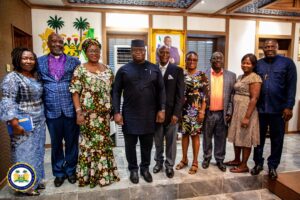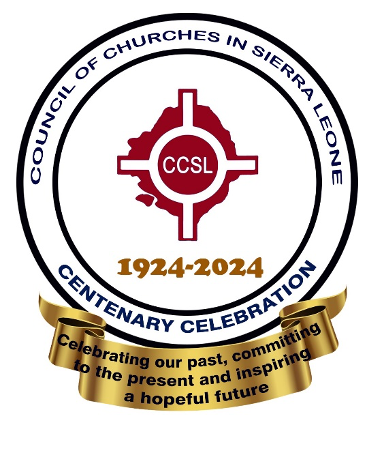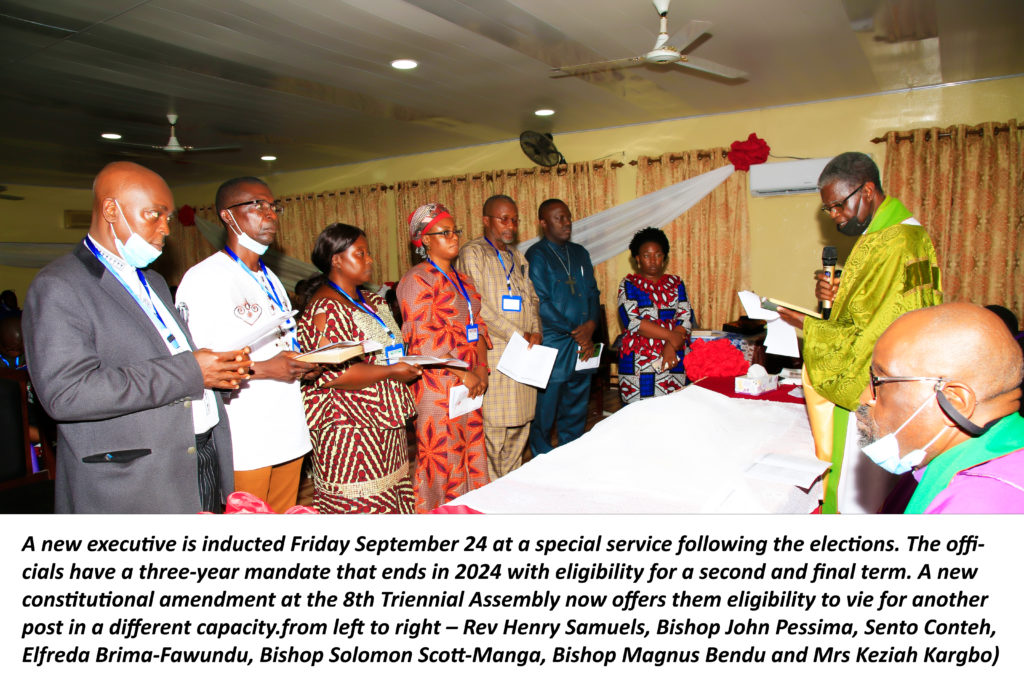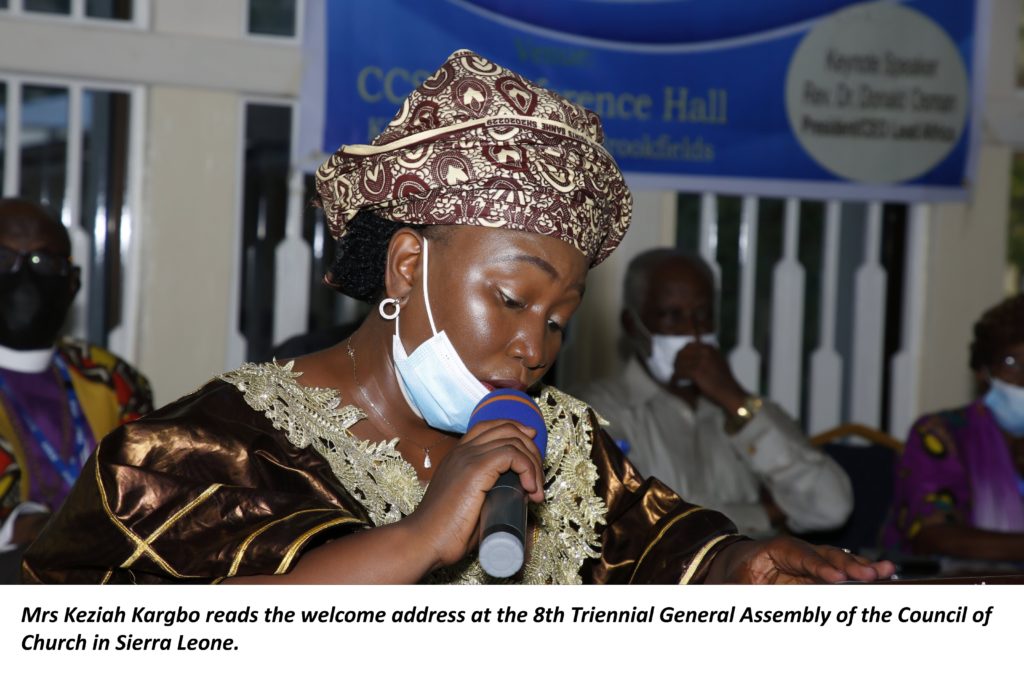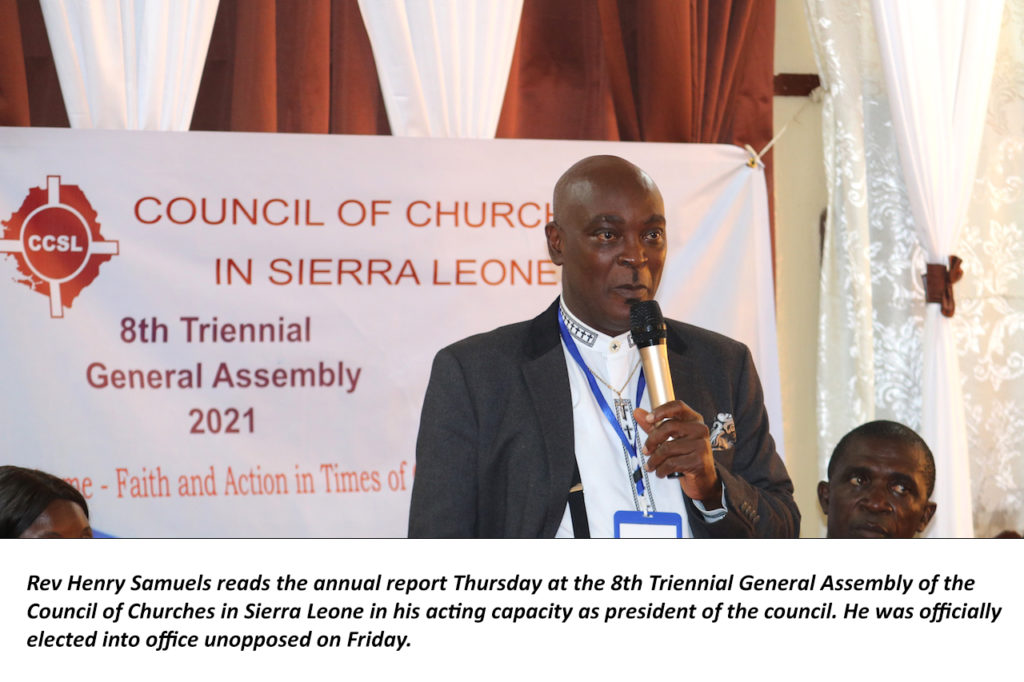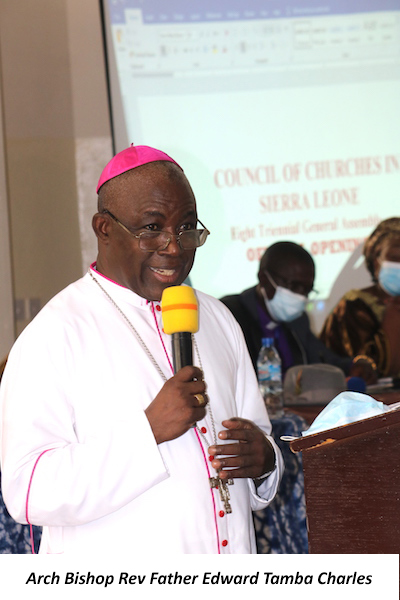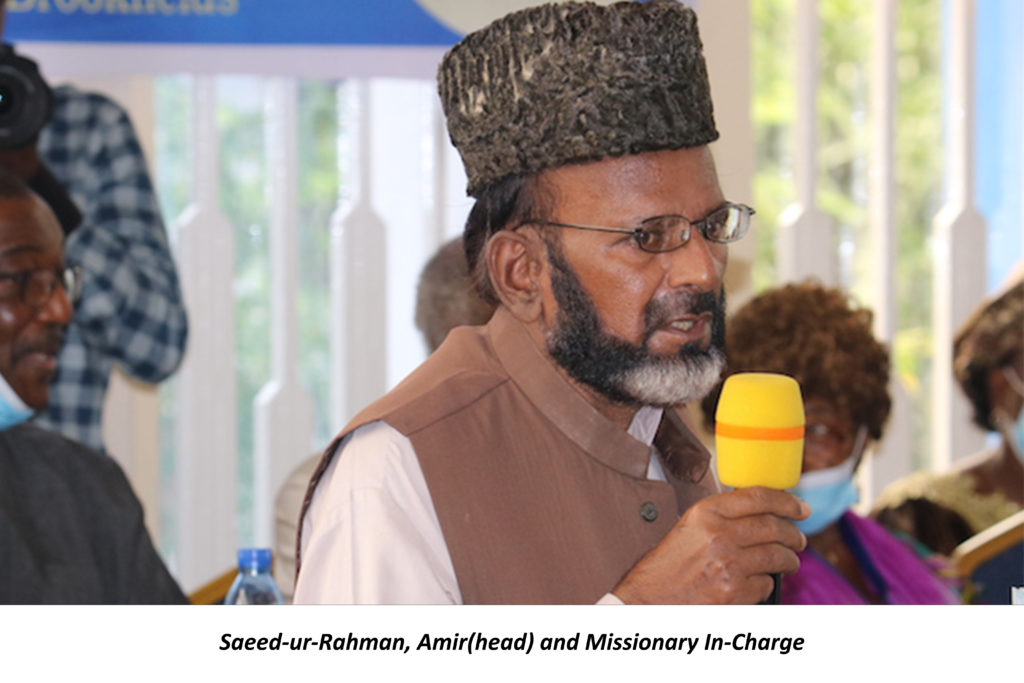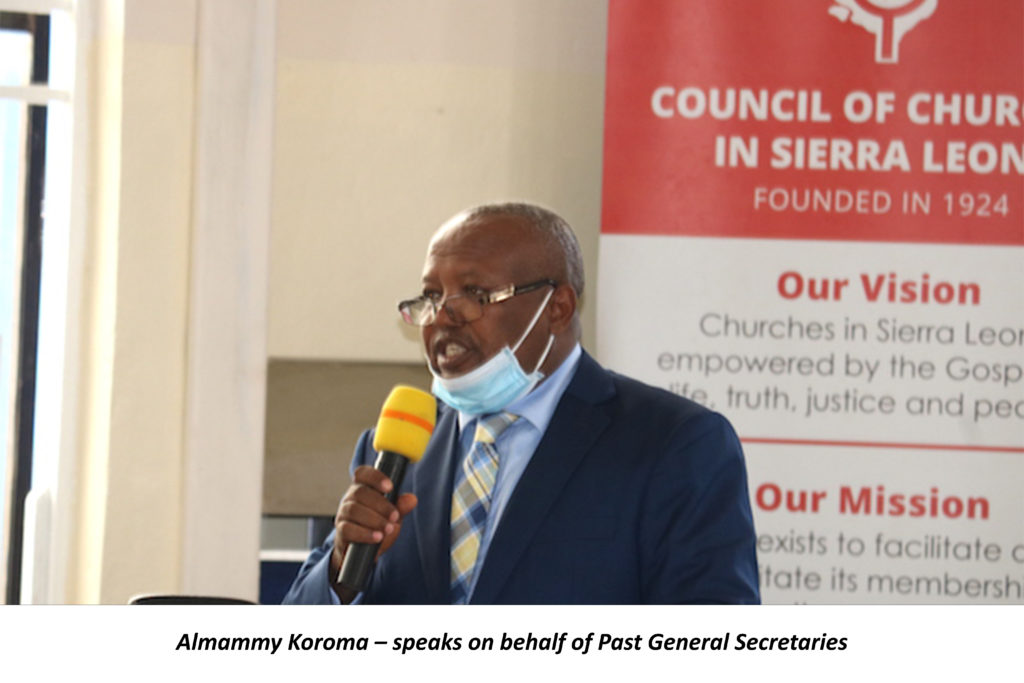He said the CCSL is expected to stand for and speak the truth and that it has done so many times in the past. He encouraged CCSL to continue doing the same. CCSL should be on the side of God’s people, he said, being a conscience of society; consistent in its outreach and roles. He said the CCSL has been consistent and acting on principles, not personalities; challenges, not colours; country, not region or tribe. These, he said, had earned the Council recognition and respect from Sierra Leoneans.
He said the theme “Faith and Action in Times of Crisis” was appropriate and timely. He said there were lots of crises in the society but the systems and institutions set to check the crises at times fail to work and it is for such reasons that the people have implicit faith and trust in the church to be their advocate. Hence, the church should not fail the people. “It should remain relevant at all times, proactive on issues and consistent in its interventions”, he emphasized.
Inter-Religious Council of Sierra Leone – Rev Dr James Fornah
Rev James Fornah thanked the CCSL for reminding the church and the religious community about their responsibility in time of crisis. The theme reminds all of two things, he said. One was that to be human was to be in crisis; and to cope with crisis was being human. “Today, we are reminded of two better ways of coping with crisis – Faith and Action”, he said. He reminded all that the religious community has a responsibility to demonstrate faith and action in time of crisis. “We need to inspire faith and action in those who are in crisis”, he said.
Bread for the World – Madam Adenike Cole
Bread for the World representative in Sierra Leone, Madam Adenike Cole who read the statement on behalf of Bread for the World in Germany said CCSL’s unique approach to Ecumenism and religious unity to peace building is unmatched. She urged all delegates to the 8th Triennial Assembly to align with the will of God so that they could think strategically as they plan the centenary celebrations in 2024. She urged council to continue to play their role in sustaining peace at all times, especially in the coming election years in Sierra Leone. She encouraged delegates who were to vote the following day to lead by example so that 30% of council officials to be elected would be women.
Keynote Speech – Rev Dr Donald Osman
The Rev Dr Donald Osman presented the keynote address. He said the theme topic, Faith and Action in Times of Crisis, required serious attention and reflection among others.
He said he would rather deal with the crisis in the church than deal with the crisis in the nation “because we have a crisis in the church…Our society is reflecting the state of the church, the health of the church and the condition of the church”. He said there are by far more churches in Freetown today than there were in 1973. Yet the society felt the presence of the church then by far more than today. “When the church spoke, people in parliament and State House trembled because they spoke with integrity and with character”, he said.
He said he would therefore speak about what he called the second-generation syndrome, which the world today is witnessing. “The crisis that we have is a crisis that stems from what I call the second generation syndrome”, he exclaimed. He said there are two revolving themes in the Book of Joshua on one hand, and the book of Judges on the other hand. The themes are – the faithfulness of the covenant keeping God; and, the unfaithfulness of the covenant breaking people. The books of Joshua and Judges stand in sharp contrast, he said. Joshua stands for, conquests, victory, triumph. Judges is a long, sad story of defeats, failures and struggles. He said while the book of Joshua stood for faith, Judges on the other hand shows unbelief and disobedience.
In Joshua, we see a people united in following God’s man. Judges, however is a book of division and anarchy as everybody did that which was right in their own eyes – “Does that describe Sierra Leone to you?”, he asked as the people giggled. “How did a people who knew continued victory through faith in the book of Joshua sink into being a nation experiencing constant defeat, failure, strife, division and disobedience? And how can you and I living today in present Sierra Leone guard against such a thing taking place in our lives?”, he asked.
He noted that Joshua, during his time, kept Israel within the blessings of God. Therefore, one man devoted to God and His word unreservedly can make an enormous difference in the lives of others. “When we trust God and build our lives on his word, we can have a godly influence in our family, in our church, in our workmates, in our society, community, our nation and indeed the world”, he asserted.
He said many present church leaders are still worshipping in the same old churches built by colonial masters and have not ventured out to build churches in new communities and expand the church to match the population growth which is replica of the second generation syndrome that happened when Israel transitioned from Joshua to Judges.
“It is a shame today that we have pastors who consult Juju men because they want to have promotions”, he said. “No wonder our society is where it is”.
He said Sierra Leone was witnessing the result of complacency since nobody is aiming for excellence. Life he said, does not allow a vacuum. In the absence of Godly, visionary leadership, there would be anarchy. “Today we are experiencing anarchy in our society because the society has no driver. The driver should be the church. When we don’t provide leadership, we have what we have. Today, our church is beset with old folks like us still hanging to power because we have not done the critical work of leadership of preparing, mentoring and discipling the next generation.
“We have not provided the leadership for State House. We have not provided the leadership for parliament. We have not provided the leadership for the city council. We have not provided the leadership for our communities. We are suffering as a church because we have failed to do the needful. There is no such thing as success without successor”, he exclaimed.
He outlined four roles for church leaders.
- To make Disciples (Matt 28:18-20)
- To care for God’s people (1st Peter 5:2-3)
- To equip God’s People for ministry (Eph 4:11-13)
- To reproduce leaders (2 Timothy 2:2)
He lamented that the present generation of leaders are victims of a culture and society of poor leadership from earlier generation leaders who did not do their job. “We are now faced with the responsibility and the awesome task of developing the kind of leaders that Sierra Leone is yearning for.
THE CHURCH’S PROPHETIC ROLE IN NATION BUILDING – A presentation By Ing Andrew Keili
Andrew Keili defined nation building as “constructing capacities to ensure self-rule, self-determination, sustainable communities, participation in the democratic process and economic viability”.
He said Sierra Leone’s independence and education have been largely spiced with Christianity – about 57% of the country’s schools are owned by missions, most of it Christian missions. Fourah Bay College, the country’s oldest university, was also founded on Christian principles, he said.
“In a community where there is a considerable influence of Christianity, there should be less of social vices because Christian teachings and doctrines are aimed at transforming individual lives, re-branding the society, such that there will be political stability, economic prosperity, social and moral sanity, a reduced rate of corruption and mutual cooperation among individuals and groups, including religions”, he said. But he said it was sad to note that the second security sector review (SSR) 2013-2022 notes that post-conflict Sierra Leone is threatened by lawlessness, indiscipline and violence among the youth while corruption, a weak political will and weak monitoring to fight the vices remain. The report also names Sierra Leone among PIDIC countries – that is countries characterized by Poverty, Illiteracy, Disease, Instability and Corruption, something he laments as a recipe for political instability.
Keili said CCSL has been contributing its part in nation building since 1924, citing its relief and rehabilitation work during and after the war; its recent concern about the pollution of the Taia River and expressed concern over the increasing spate of violence in the country among others. “Apart from its ecumenical relationship Department, CCSL also has a Human Rights and Social Services Department and a Development Department. It has been dealing with contemporary issues facing the Church and society including Food Security and Climate change, the promotion of and enhancement of sustainable peace to ensure the gains of the last decade, mitigation of Gender Based Violence and Quality Education”, he said.
CCSL affiliate organization, the Christian Health Association of Sierra Leone (CHASL) has also continued to deliver good services in the health sector, he said. These coupled with the contribution by individual churches across the country in reaching out to various needy groups across the country shows that the church is playing its prophetic role to some extent, he reckoned.
But despite these, he said, the church stands challenged in addressing the everyday problems of Sierra Leone, which are significant for nation building. The challenges, he said, are hinged on “the negative attitude of some Christians, socio-economic problems faced by various segments of our society and the attitude of those in authority …”. This is because many church development programmes depend on government ministries, departments and agencies. Besides, church members themselves are entangled in activities that undermine nation-building goals. All these make it difficult for the church to live up to its prophetic role in nation building.
“In spite of the increase in the number of people who attend churches on a daily basis and annual religious gatherings, there is still a high level of greed, corruption, nepotism, injustice and impunity in the nation”, he said.
He suggested the following among others as the church’s prophetic role in nation building:
– Preaching the undiluted word of God and addressing the Biblical position on national issues.
– The formation of a development wing within churches that addresses development issues should be encouraged and intensified.
– The church should exploit the work of various organizations involved in nation building and explore synergies.
– The church should be more inclusive
– The Church should consider getting actively involved in Alternative Dispute Resolution
– The Church should put greater emphasis on the development and operation of a Youth Ministry.
